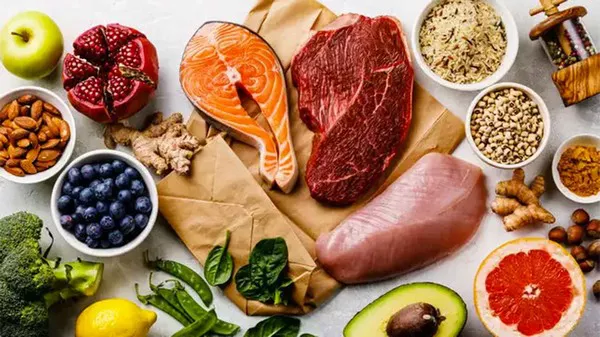Protein is an essential macronutrient that plays a critical role in the human body. It serves as the building blocks for tissues, enzymes, hormones, and various other molecules crucial for proper functioning. Adequate protein intake is vital for muscle repair, immune system support, and overall health. In this article, we will explore a variety of high-protein foods that can be incorporated into a balanced diet to promote optimal well-being and fuel your body with essential nutrients.
The Importance of Protein in the Diet
Protein is made up of amino acids, which are essential for the growth, maintenance, and repair of tissues in the body. Unlike fats and carbohydrates, the body does not store protein, so it must be obtained regularly from the diet. Proteins are involved in various physiological processes, including muscle development, enzyme production, immune system function, and hormone regulation.
Adequate protein intake is particularly crucial for individuals engaged in physical activity, athletes, and those recovering from injuries, as it supports muscle repair and aids in recovery. Additionally, protein can help regulate appetite and promote satiety, making it beneficial for weight management.
Animal-Based High-Protein Foods
a) Lean Meats:
Lean meats are excellent sources of high-quality protein. Examples include chicken breast, turkey, lean beef, and pork. They are not only rich in protein but also provide essential nutrients such as iron, zinc, and B vitamins.
b) Fish and Seafood:
Fish and seafood are not only high in protein but also provide healthy omega-3 fatty acids. Salmon, tuna, cod, shrimp, and trout are some popular choices that offer a well-rounded nutritional profile.
c) Eggs:
Eggs are a versatile and affordable source of complete protein. They contain all the essential amino acids required by the body. Additionally, eggs are rich in choline, which is essential for brain health.
d) Dairy Products:
Dairy products such as Greek yogurt, cottage cheese, and milk are protein-rich options. They are also good sources of calcium, which is vital for bone health.
e) Cheese:
Cheese is a concentrated source of protein and can be incorporated into various dishes. However, it is essential to consume it in moderation due to its high calorie and fat content.
Plant-Based High-Protein Foods
a) Legumes:
Legumes, such as lentils, chickpeas, black beans, and kidney beans, are excellent sources of plant-based protein. They are also high in fiber, which supports digestive health.
b) Tofu and Tempeh:
Tofu and tempeh are soy-based products that offer a substantial amount of protein and are versatile ingredients in plant-based cooking.
c) Edamame:
Edamame, or young soybeans, are a tasty and protein-packed snack. They can be enjoyed steamed with a sprinkle of salt or added to salads and stir-fries.
d) Quinoa:
Quinoa is a unique grain that is a complete protein source, containing all nine essential amino acids. It is also gluten-free and an excellent option for individuals with dietary restrictions.
e) Nuts and Seeds:
Nuts and seeds, such as almonds, chia seeds, flaxseeds, and pumpkin seeds, are protein-rich snacks that provide essential healthy fats and micronutrients.
f) Seitan:
Seitan, also known as wheat gluten, is a high-protein meat substitute often used in vegetarian and vegan dishes.
Incorporating High-Protein Foods into Your Diet
a) Balanced Meals:
Include a source of protein in each meal to promote satiety and provide sustained energy throughout the day. Combining protein with complex carbohydrates and healthy fats creates balanced meals that support overall health.
b) Snacks:
Opt for high-protein snacks to keep hunger at bay and prevent overeating. Greek yogurt, nuts, hard-boiled eggs, and hummus with veggies are nutritious snack options.
c) Smoothies:
Create protein-packed smoothies by adding protein powder, Greek yogurt, or tofu along with fruits and vegetables. This is a convenient way to boost protein intake, especially for those with busy schedules.
d) Salads:
Enhance the protein content of salads by adding grilled chicken, tofu, chickpeas, or hard-boiled eggs.
e) Stir-Fries:
Stir-fries offer a great opportunity to incorporate various protein sources, such as lean meats, tofu, or tempeh, along with a variety of vegetables.
Considerations for Special Dietary Needs
a) Vegetarian and Vegan Diets:
Individuals following vegetarian or vegan diets can obtain ample protein from plant-based sources. Combining different plant proteins, such as legumes and grains, helps ensure a complete amino acid profile.
b) Food Allergies and Intolerances:
For those with food allergies or intolerances, it is essential to find alternative protein sources that meet their dietary needs. Allergen-free protein powders, seeds, and legumes may be suitable options.
Protein Supplements
In some cases, protein supplements may be beneficial for individuals with increased protein requirements, such as athletes or those recovering from injuries. Protein powder derived from whey, casein, soy, rice, or pea protein can be added to smoothies, shakes, or recipes to boost protein intake conveniently.
It is essential to choose high-quality supplements and consult with a healthcare professional or registered dietitian before incorporating protein supplements into the diet, especially for individuals with specific health conditions or medical concerns.
Conclusion
Protein is an indispensable nutrient that supports various physiological processes in the body. Incorporating a variety of high-protein foods into a balanced diet ensures adequate intake of essential amino acids and promotes overall health and well-being.
Animal-based sources like lean meats, fish, eggs, and dairy products provide complete proteins and additional nutrients. Plant-based sources like legumes, tofu, quinoa, and nuts offer excellent options for individuals following vegetarian or vegan diets.
By creating balanced meals, incorporating high-protein snacks, and considering individual dietary needs, individuals can fuel their bodies with essential nutrients and maintain optimal health through a diet rich in protein. For those with specific requirements or increased protein needs, protein supplements can be a valuable addition, provided they are used wisely and under the guidance of healthcare professionals. Remember, a well-rounded diet that includes an appropriate amount of high-protein foods is a key element in achieving and maintaining a healthy lifestyle.


